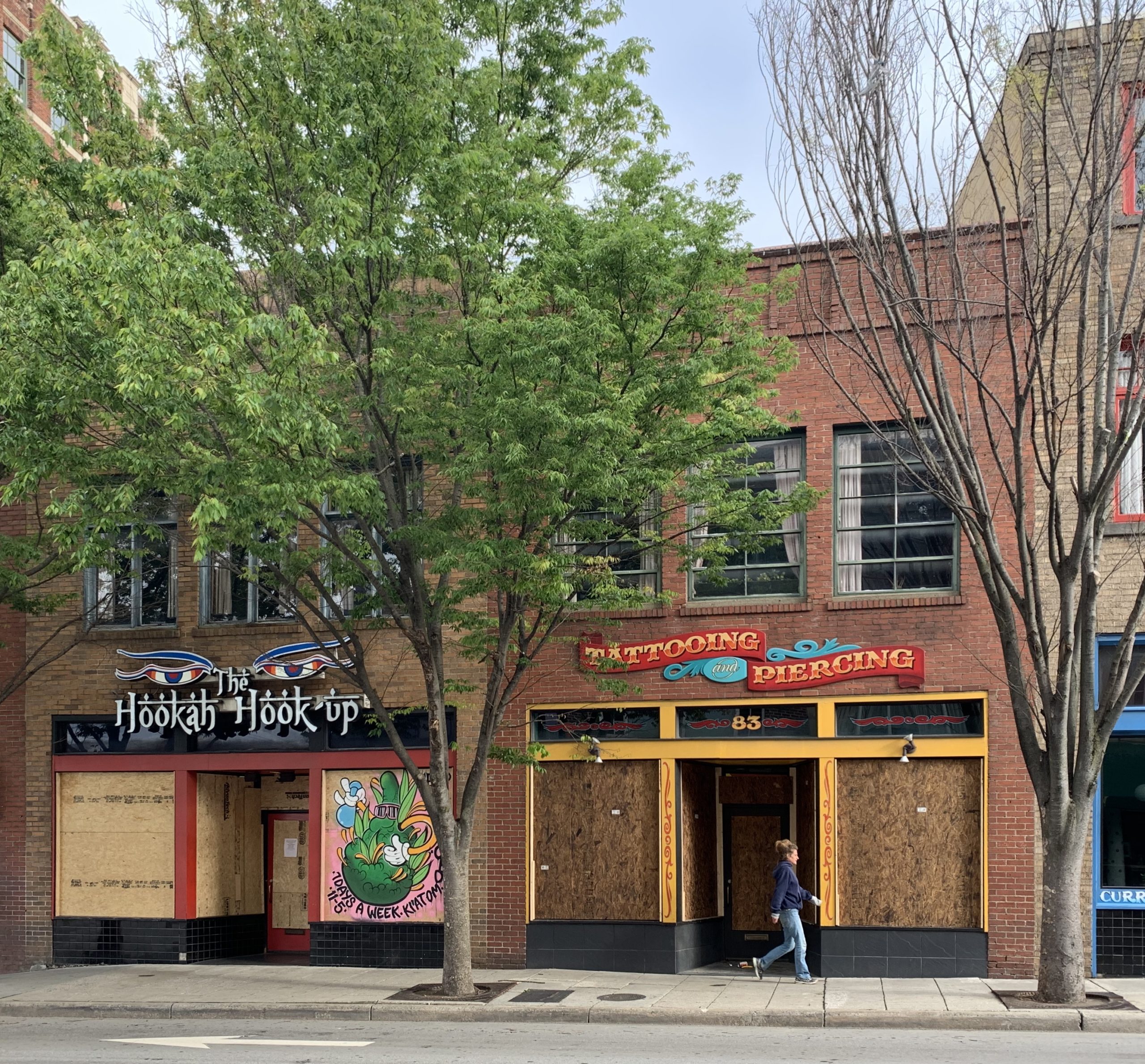
The Westville Pub in West Asheville boarded up its outdoor seating area to deter people from gathering amid concerns about the spread of COVID-19./ photo by Brooke Randle
As businesses throughout Buncombe County continue to shutter their doors in response to emergency measures related to COVID-19, thousands of residents and businesses owners have been left scrambling to find funding for basic needs like rent, utilities or payroll expenses.
But among the seemingly endless amounts doom and gloom is a glimmer of hope: During their March 24 meeting, members of Asheville City Council unanimously approved Asheville’s participation in the One Buncombe Fund, a localized financial relief fund which aims to provide support to individuals and businesses impacted by the spread of the novel coronavirus and the illness it causes, COVID-19. Council members also set a public hearing for Tuesday, April 14, to consider a $100,000 allocation from the city’s general fund to jumpstart the initiative.
According to Sam Powers, the city’s community and economic development director, the measure is specifically aimed at individuals and businesses that have exhausted all other government assistance and relief efforts, or that don’t fit eligibility requirements for other public assistance programs, like unemployment insurance.
“While programs may exist to support members of our community, many of the individuals impacted by COVID-19 will not be eligible, people like independent contractors, for example,” Powers said. “While there are also programs being designed to support businesses, many of the businesses impacted by COVID-19 will not be able to sustain operations until disaster relief funding is available.”
According to a staff report available before the meeting, the fund is being developed and managed through a partnership among the elected officials from the city and Buncombe County, the Asheville Area Chamber of Commerce, Mountain BizWorks and the Land of Sky Regional Council, and would include both an individual and a small business relief component.
Financial assistance for individuals, said Powers, will be administered through Buncombe County’s Health and Human Services Department and would provide funding for “life essential needs,” such as utility bills, mortgages and rent assistance. He also noted that the direct assistance grants would be paid to service providers, not directly to individuals.
The small business support would come in the form of low-interest loans of up to $10,000 with no payments for six months to support business operations including payroll, accounts payable, fixed debts and other bills that businesses are unable to pay. Businesses with less than 50 employees are eligible for the loans, and Mountain BizWorks, the community development nonprofit , would provide the loan underwriting and administer the program.
“This would be, in essence, low-cost bridge funding to help businesses stay open and limit job losses until businesses can qualify for longer term disaster funding from [the Small Business Administration] or other entities,” he explained.
Powers said that the nonprofit Buncombe County Service Foundation would serve as the fiduciary for the fund, and that One Buncombe would be governed by a seven-member board of directors which would include members from local government, banking, business and the philanthropic communities. Assistant City Manager Richard White, Buncombe County Health and Human Services economic services director Phillip Hardin and recently retired First Bank regional president Suzanne DeFerie, are among the board’s committed members, while other board members are still being considered.
“Again, this is still all being developed,” Powers said. “We will be able to provide much more information to you at the date of the public hearing on April 14, but we felt that it was important to go ahead and request the Council’s interest in participating and to try and schedule the public hearing date.”
“This is one of those things that gives me hope in the midst of this crisis, organizations coming together again given the lack of leadership that we’re seeing from the federal level,” said Council member Julie Mayfield before the vote. “There’s a lot that we can do in this community and this is a perfect example.”
Powers said with the support of the county’s other municipalities, which he noted are currently scheduling called meetings on the issue, the Buncombe County Health and Human Services may start receiving applications from individuals seeking relief as soon as this week. Business funding will be available if Council approves the $100,000 allocation during the April 14 public hearing on the issue.
Council receives more than 100 emails from public
According to City Clerk Maggie Burleson, 130 people submitted comments to the Council after the city announced new temporary guidelines for public comment and meeting proceedings March 21 which mandates that comments must be no more than 350 words and received either by email or voicemail during the local state of emergency.
The bulk of the comments — 96 — were in support of the city funding an urban forester and an urban forest master plan in its 2020-21 budget. While Burleson only read less than 10 of the comments aloud in the Council Chambers, she said that all of the comments would be attached to the meeting minutes for the March 24 meeting as public record.























